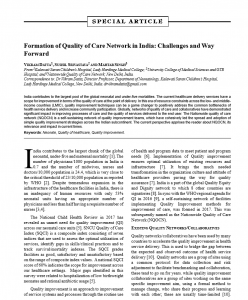
India contributes to the largest chunk of the global neonatal, under-five and maternal mortality. The number of physicians/1000 population in India is 0.7 and the number of midwives, nurses and doctors/10,000 population is 24.4, which is very close to the critical threshold of 23/10,000 population as reported by WHO. Despite tremendous expansion in the infrastructure of the healthcare facilities in India, there is an inadequacy of human resources with only 53% neonatal units having an appropriate number of physicians and less than half having a requisite number of nurses.
The National Child Health Review in 2017 has revealed an unmet need for quality improvement (QI) across our neonatal care units. SNCU Quality of Care Index (SQCI) is a composite index consisting of seven indices that are used to assess the optimal utilization of services, identify gaps in skills/clinical practices and to track survival/mortality indexes. The SQCI grades facilities as good, satisfactory and unsatisfactory based on the range of composite index values. A national SQCI score of 60% indicates the scope for improvement across our healthcare settings. Major gaps identified in this survey were related to hospitalization of low birthweight neonates and rational antibiotic usage.
Quality improvement is an approach to improvement of service systems and processes through the routine use of health and program data to meet patient and program needs. Implementation of Quality improvement ensures optimal utilization of existing resources and infrastructure. It brings the much needed transformation in the organization culture and attitude of healthcare providers paving the way for quality assurance. India is a part of the global Quality Equity and Dignity network to which 8 other countries are signatories. In sync with the WHO regional agenda for QI in 2016, a self-sustaining network of facilities implementing Quality Improvement methods for improvement of care, was formed in 2017. This was subsequently named as the Nationwide Quality of Care Network (NQOCN).
—
This special issue of Indian Pediatrics (September 2018; Volume 55: Number 9) highlights mechanisms that can support health care providers in using various quality improvement (QI) approaches and showcases some of the improvement projects undertaken in India by different teams.
The USAID ASSIST Project started working in India in September 2013; initially working directly with districts and facilities to help them learn how to use QI approaches to save lives. This work went well and the staff in these facilities were able to reduce perinatal mortality by 15% over 18 months. During this time, we met great partners from important organizations and institutions across India.
These institutions are now leading a growing movement to help more people apply QI methods to deliver care that prevents harm, improves outcomes, and meets the needs of the people receiving it through their own networks using domestic funding; continuing these lifesaving efforts after ASSIST technical support has ended.
The supplement shows important results of the ongoing QI work in these networks and shows how domestic QI networks, earlier supported by ASSIST, are now independently supporting and spreading the use of QI methods to provide better care.